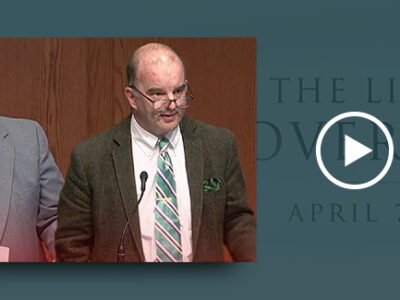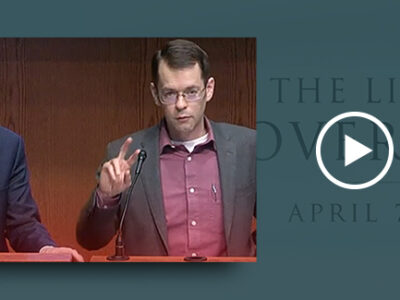On Thursday, January 11, the new Democratic Congress followed through on its ambitious agenda to promote embryonic stem-cell research. As it moves forward, President George W. Bush will be grabbing his veto pen. As he does, we will hear charges that the president is “anti-science,” and that faith has once again trumped reason.
This allegation will not be restricted to the pages of The New York Times. I recently read an article by a right-leaning British observer who took issue with President Bush’s “anti-scientific perception that stem-cell research should be deterred.” The author considered whether this alleged unsophisticated attitude was the product of a very “un-European willingness” by Americans “to believe in supernatural forces.”
This unflattering view of not only the American president but millions of like-minded citizens is hardly uncommon. It also requires some explanation:
First, a crucial distinction: George W. Bush, like many Americans, opposes federal funding of embryonic stem-cell research. No one opposes research on adult stem cells or stem cells acquired through umbilical cord blood or bone marrow—the debate is over stem cells acquired through the killing of an embryo. Bush is against the use of taxpayer dollars to fund the creation of human embryos for the sole purpose of scientific research.
For the record, Bush, like many Americans, indeed invokes his faith in explaining his position. He maintains that all human life is a “precious gift” granted by a “loving God,” “a creation, not a commodity,” and therefore should be protected at all stages of development.
Importantly, there is an equally significant non-religious component to his position. For example, on July 19, 2006, Bush exercised the first veto of his presidency—on embryonic stem-cell research. Holding a press conference surrounded by 18 families with children who had once been frozen embryos, Bush said that if the Stem Cell Research Enhancement Act had become law, “for the first time in our history we would have been forced to fund the deliberate destruction of human embryos, and I’m not going to allow it…. [W]e all began our lives as a small collection of cells.” Bush said that Americans “must never abandon our fundamental moral principles in our zeal for new treatments and cures.”
Four years earlier, on April 10, 2002, Bush offered added insight into his thinking: “Advances in biomedical technology must never come at the expense of human conscience…. [E]ven the most noble ends do not justify any means.” He warned against pursuing medical research “without an ethical compass into a world we could live to regret.”
The president, like many Americans, is appalled at the prospect of “embryo farms” or “parts farms”—the start of a slippery slope into a Brave New World in which certain human beings may one day be raised merely for their parts; parts exploited by those lucky enough to have been born and not “harvested” for their parts.
Here, however, is the crucial point, missed by the aforementioned British observer and those who agree with him: One need not be a religious believer to oppose embryonic stem-cell research.
In fact, secular-minded liberals—the vast majority of which support embryonic research—ought to see the obvious unfairness in creating and then terminating undeveloped human life simply for the benefit of the living; at the very least, this literally unprecedented technological leap should give pause. Any religious-left liberal, such as Hillary Rodham Clinton or John F. Kerry, both staunch backers of embryonic research, who invoke “social justice” to advance economic-class goals, should see the inherent injustice in this technology. The late Pennsylvania Governor Robert Casey, a pro-life Democrat, could not fathom how his fellow liberals, who preached the rights of the underdog, were so unwilling to protect unborn human life. And Casey did not need his local parish priest to convince him.
Of course, religious reasoning can turn a supporter of embryonic research into an opponent. I have seen pro-choice Catholics change their positions on abortion after reading encyclicals like Humanae Vitae and Evangelium Vitae. The latter was written by the previous Pope, who appealed to the “two wings” of faith and reason in his pro-life thinking. The embarrassingly misinformed notion—by people who pride themselves for their self-perceived intellectual superiority—that faith and reason are incompatible violates some 800 years of religious teaching dating back to Thomas Aquinas.
Yet, the point is that one need not “believe in supernatural forces” to oppose taxpayer funding of embryonic stem-cell research. Scientific understanding, backed by common sense and compassion, can easily move any rational person in that direction.
Personally, I find it difficult to fathom how anyone cannot see the unfairness in destroying human embryos strictly for our own needs. What is it about the embryo that denies it the most fundamental right of life: its size, its lack of consciousness? To the contrary, one might conclude that such vulnerabilities—such defenselessness—means that an innocent embryo merits our special protection. Sadly, supporters of embryonic research have concluded that our personal health needs justify this essential denial of life to other members of the human family. That is not right—regardless of your faith.




